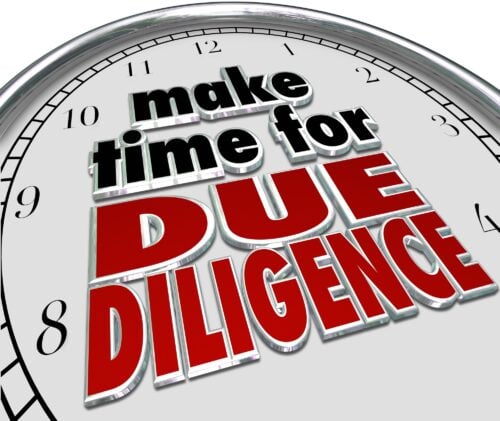When it comes to stocks, there are a lot of acronyms and abbreviations that can be confusing for beginner investors. DD is one such acronym that has multiple meanings. So, what does DD mean in stocks? Read on to find out.
What Does DD Mean in Stocks?
When a stock trader or analyst mentions “DD” in relation to a stock, it means that they are performing “due diligence” on the company.
Alternatively, “DD” could also rarely mean that the trader is choosing to “double down” on their current position in the stock, meaning they are confident in the investment and choose to increase their holdings.
DD can also stand for other things in the finance world, so it is best to clarify the specific definition in a given context to understand its implications fully.
What Is Due Diligence?
When referring to due diligence, DD in stocks is the process of thoroughly researching a potential investment.
Due diligence involves gathering all relevant information, including financial records, legal documents, management team backgrounds, competition, and potential red flags.

This research is an essential step in the investment process and can help protect against unforeseen problems or liabilities.
In addition to researching the investment itself, due diligence also includes verifying the accuracy of any information provided by the seller or company.
What Are the Types of Due Diligence?
There are four types of due diligence: financial, accounting, tax, and legal. Each type has a different focus to assess when acquiring a new business or product.
- Financial Due Diligence – The process of assessing a company’s financial stability and health. This includes reviewing past financial statements, cash flow projections, and other financial data.
- Accounting Due Diligence – This focuses on the accuracy of the company’s accounting records and procedures. It includes evaluating the company’s bookkeeping methods, internal controls, and financial reporting processes.
- Tax Due Diligence – This reviews a company’s tax compliance history and assesses any potential tax liabilities that may arise from the acquisition.
- Legal Due Diligence – Evaluates all legal risks associated with the transaction, including contract review, intellectual property issues, and regulatory compliance.
Where Did the Term Due Diligence Come From?
The term “due diligence” originated from the combination of the Latin words debere and diligentia. Debere means to owe, and diligentia means carefulness or attentiveness.
This phrase has been commonly used in contract law since the mid-1400s, referring to a party’s duty to perform their responsibilities with care and attention.
In modern business usage, due diligence refers to the thorough investigation and analysis of a company or organization before entering into an agreement or transaction with them.
Hard vs Soft Due Diligence
Depending on the method used, the due diligence process can be classified as either “hard” or “soft.”
Hard due diligence
Hard due diligence is the thorough investigation and analysis of a company’s financial and operational performance, as well as its management team and legal compliance.
It also includes evaluating a company’s competitive positioning and industry dynamics.

Some of the specific areas that may be examined during hard due diligence include financial statements, revenue growth trends, cost structure, debt levels, intellectual property, customer contracts, regulatory compliance, litigation history, and management succession planning.
Soft due diligence
Soft due diligence is when an investor gathers information to assess a company’s ethical behavior and culture.
This includes examining areas such as diversity and inclusion practices, labor rights, environmental impact, and corporate governance policies.
Soft due diligence can help ensure that investments align with personal values and support responsible business practices.
You can get these company details typically through publicly available resources and conversations with management, but without the in-depth review provided by hard due diligence.
This type of due diligence may be appropriate for smaller investments or deals with a shorter time frame as it does not have the same level of assurance as hard due diligence.
Can You Do Your Own Diligence?
Yes, you can do your own due diligence when it comes to researching potential investments.
One way to gather information is by analyzing financial statements and reading through company press releases and analyst reports.
It can also be helpful to speak with industry experts or attend investor conferences to gain insight into the industry dynamics.
While conducting due diligence yourself may seem like a cost-effective option, it is important to consider the consequences.
Without proper training and expertise, you could miss critical information impacting your decision to proceed with a transaction.
How to Do Your Due Diligence?
As a potential investor, several steps must be taken during the due diligence process before committing to any investment opportunity.
Analyzing the Market Capitalization
One major aspect of due diligence is analyzing the company’s market capitalization.
This refers to the total value of all of a company’s outstanding shares and can give insight into its overall size and standing in its industry.
To calculate market cap, simply multiply the current share price by the total number of outstanding shares.
Large-cap companies have more stable revenue streams and are less volatile than small-cap companies.
Market cap can fluctuate rapidly, as it is heavily influenced by changes in the company’s stock price.

The market cap may increase or decrease in response to market conditions, financial announcements, and other external factors.
Monitoring the Revenue and Profit Margin
Some key metrics to pay attention to include overall revenue growth, quarterly or annual changes in revenues, and gross profit margins.
Revenue refers to the total amount of money brought in by a company through its sales and services.
A consistent and increasing trend in revenue can indicate a healthy and growing business.
Margin is the percentage of profit a company makes from its total revenue.
A high margin indicates that the company is efficiently managing its expenses and generating significant profits.
Checking the Competition
This involves identifying the direct competitors and any substitutes for the company’s products or services.
To gather this information, you can start by conducting online searches and making a list of companies offering similar items.
Once you clearly understand the competitors, you can analyze the threats, strengths, and weaknesses.
This can be done by looking at factors such as pricing, product features, reputation, stock price history, and market share.
This competitive analysis will not only inform your business strategy but can also help in identifying potential partnership or acquisition opportunities.
Researching the Management and Ownership
This step includes looking into the company’s past experiences, successes, and failures.
It also involves understanding the ownership structure, including any insider ownership and conflicts of interest.

This information can give an idea of how well-equipped and trustworthy the management team is.
Some research also includes looking into the company’s board of directors and evaluating their qualifications and level of independent oversight.
It’s also beneficial to remain updated on any regulatory or legal issues the company may face. This can impact both the short and long-term success of the investment.
Reviewing the Balance Sheet
Reviewing the company’s balance sheet is a must. This document outlines the company’s assets, liabilities, and equity.
In addition to examining numbers, look at the company’s cash flow statement.
This can show how much money is coming in and going out and whether or not the company has enough cash on hand to cover its expenses.
You can also review past financial statements to ensure there are no consistently high levels of debt or declining revenues.
Final Thoughts
DD can mean a lot of things in the stock market world. But the meaning discussed here today was “due diligence.”
Ultimately, it includes research on the company, its products or services, and its financial stability and performance.
Conducting thorough due diligence can help ensure a successful investment decision, but it is not a guarantee against risk.
Don’t forget to continue monitoring investments even after completing due diligence research to stay aware of any changes or developments.
You might also like:


 Tags:
Tags:










